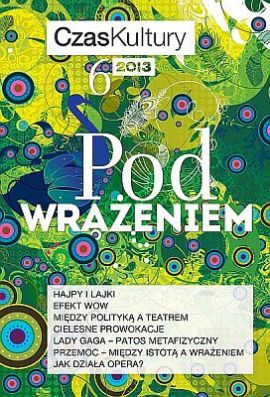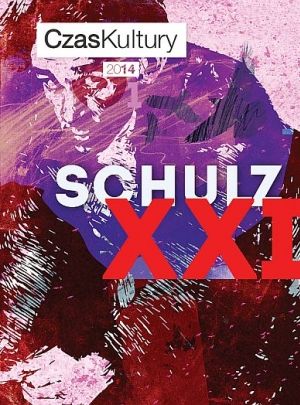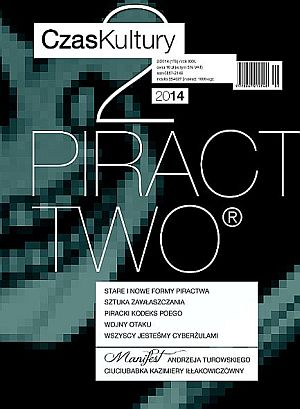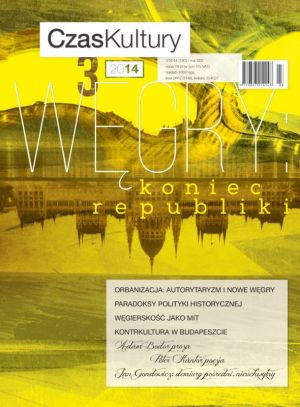
We kindly inform you that, as long as the subject affiliation of our 300.000+ articles is in progress, you might get unsufficient or no results on your third level or second level search. In this case, please broaden your search criteria.


The article is an “intermedia” attempt to analyse Dariusz Sosnicki’s debut work. The consequence of this type of perspective (confronted with more traditional techniques of reading) is its treatment of a poem not so much as a work whose meaning must be decoded, as a recording of certain actions that mimic the gestures of a “man with a camera”. The primary object of study is, thus, a rhetorical game between the poetic phrase and the film cadre. The figure of the reader incorporated in the article is representative of readers today, whose perceptual habits have been shaped by audiovisual media.
More...

J. Bator, "Ciemno, prawie noc" / K. Koehler, "Boży podżegacz. Opowieść o Piotrze Skardze" / J. Polkowski, "Ślady krwi" / Sz. Twardoch, "Morfina" / B. Wildstein, "Ukryty"
More...
In 2012, a number of events were held to mark both the centenary of the birth and the 70th anniversary of the death of the Drohobych-born writer Bruno Schulz, including memorial, public awareness and academic projects which resulted in numerous publications that helped ensure the continued vigorous growth of Schulzology in the 21st century. The year 2013 likewise provided a major impetus for the popularization of Schulz’s achievements, since in this year the copyrights to Schulz’s works expired, allowing them to be freely reproduced. A review of the most recent published works in Schulzology serves as an opportunity to ask questions of a more general nature about trends in research on Schulz’s work, which is dominated by W. Panas’ cabbalistic interpretation. This includes other readings of the author of „The Street of Crocodiles” from within a Jewish context, efforts at a radical reorientation in research and philosophical hermeneutics (M.P. Markowski), attempts to read Schulz’s work in terms of political problematics, and the phenomena of the “celebritisation” of literary criticism.
More...
The article discusses some key issues related to worldview in the work of Bruno Schulz, analyzing it through the lens of posthumanist philosophy. In the article, issues such as Schulzian anthropology, the notion of principium individuationis, and the position of the author of "The Street of Crocodiles" in relation to civilizational change are presented in discourse with critical readings of Schulz’s writing. Aspects hardly noticed in previous interpretations are brought to the fore, such as, the laboratory featured in the stories, and the depiction of Egga van Haardt and the convalescent in the essay “A Skeptic’s Wanderings”. The demiurgic acts of the Father in Schulz’s stories are considered in light of artistic activities within mainstream bio art. The author explores Schulz’s characteristic prosthetic principle of creation, relating it to both the construction of bodies and a philosophy of Schulz’s language.
More...
The article discusses Bruno Schulz’s disabled characters, focusing on the stories “Dodo” and “Edzio”, in terms of the situation of disabled people during the interwar period. Highlighted are the problems faced by disabled persons who are portrayed in these stories. The attitude of the narrator to disabled characters is also analyzed: on the one hand, he is fascinated by people with deformities, who to him are a form of degenerated matter, and speaks about them with irony; on the other hand, he looks at them through the prism of the difficulties they encounter in life (social exclusion, a lack of self-realization, physical barriers, an inability to use free time, poor social conditions, unsatisfied basic needs).
More...
The article focuses primarily on the ontological status of the object. Schulz’s stories often feature as nodal points ordinary things that in the eyes of the characters are transformed into extraordinary things. To describe this transformation, the author focuses on one story – “Spring”. The main aim of the texts is to reconstruct Schulz’s ideas about the ontology of things. Heidegger’s late philosophy is used as the instrument for carrying out this reconstruction. The author tries not to overuse Heidegger’s nomenclature; however, he extracts from Schulz’s story the figure of the “quadrilateral”, the “Between” that exists between the earth and sky, and the gods and mortals.
More...

Interview with Tadeusz Dąbrowski, editor of Zuzanna Ginczanka's poems volume.
More...

The article attempts to interpret the figure of the Father from "The Street of Crocodiles". The author makes use of poststructuralist theories that allow him to read the father’s illness as a metamorphosis corresponding to the processes of becoming–animal and becoming–invisible. For this purpose, the concepts of Gilles Deleuze and Félix Guattari are used, as is the work of Claire Colebrook, who popularized the thinking of these two philosophers. The Father’s disease, according to the article’s author, is seen as an escape to beyond what is human. Constituted by a multiplicity of desire and affect, his disease allows for an abandonment of the principles of realism and, thus, a crossing over into the realm of the absurd.
More...
This article presents and interprets the relationship between two sisters, the popular poet Kazimierza Iłłakowiczówna and her unknown sister, Barbara Czerwijowska, who was also a poet and who helped Iłłakowiczówna in her creative work (as an editor and advisor on translation matters). The article considers the illegitimate origins of the two women, the different paths they took in terms of education, career and their personal life, and their shared passion for writing. The article compares two lyrical poems written by both women and dedicated to their sister, and writings about the sisters contained in Czerwijowska’s partially unpublished "Memoirs" and in letters Iłłakowiczówna wrote to her sister.
More...
Kazimiera Iłłakowiczówna was the author of four books of fiction in which we can find what Małgorzata Czermińska calls an autobiographical attitude. The degree of openness and the significance of autobiography in each of these works, however, varies. The article seeks to show two different autobiographical strategies used by Iłłakowiczówna. The first, present in "On the Path Beside the Road" and in "From a Broken Stereoscope" involves masking the presence of the autobiographical ‘I’; the second, appearing in "Untimely Confessions" and "Trasimeno Hare", in contrast, is entirely open. Both strategies share one thing in common –hidden behind diverse seemingly modest topics there is in reality a strong sense of self-affirmation.
More...


This article attempts to reinterpret the poetry of Tadeusz Różewicz (with particular emphasis on his last books) from a perspective defined by the category of spectrality. According to the author of the essay, this topic – creatively developed by J. Derrida, and returning in the texts of such thinkers as Giorgio Agamben and J.D. Caputo – provides us with a relatively consistent means of approaching Różewicz’s poetic oeuvre, including his dialogue with mass culture in the books "Kup kota w worku" [Buy a Pig in a Poke], and "To i Owo" [This and That]. Emphasis is placed on the themes of the death of poetry, language, and God found in Różewicz’s work, which – taken together – lead us to postsecular reflection on the concept of the media and the issue of mediatization.
More...

